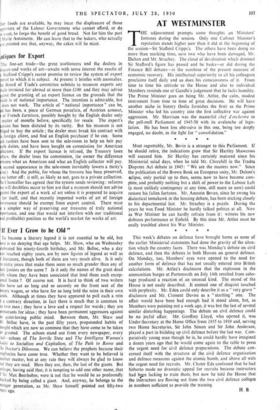AT WESTMINSTER
THE adjournment prompts some thoughts on Ministers' fortunes during the session. Only one Cabinet Minister's reputation stands higher now than it did at the beginning of the session—Sir Stafford Cripps's. The others have been doing no more than marking time, save two who have been damaged, Mr. Dalton and Mr. Strachey. The cloud of devaluation which dimmed Sir Stafford's figure has passed and he basks—or did during the Finance Bill debates—in the sunshine of the present measure of economic recovery. His intellectual superiority to all his colleagues proclaims itself daily and so does his consciousness of it. From time to time his attitude to the House and also to individual Members reminds one of Gandhi's judgement that he lacks humility. The Prime Minister goes, on being Mr. Attlee, the calm, modest instrument from time to time of great decisions. He will have another niche in history (India furnishes the first) as the Prime Minister who led his country into the first collective war against aggression. Mr. Morrison was the masterful chef d'orchestre in the pell-mell Parliament of 1945-50 with its avalanche of legis- lation. He has been less obtrusive in this one, being too deeply engaged, no doubt, in the fight for " consolidation."
* * * * Most regrettably, Mr. Bevin is a stranger to this Parliament. If he should retire, the indications grow that Sir Hartley Shawcross will succeed him. Sir Hartley has certainly matured since his Ministerial salad days, when he told Mr. Churchill in the Trades Disputes Act debate in 1945: " We are the masters now." Since the publication of the Brown Book on European unity,. Mr. Dalton's eclipse, only partial up to then, seems now to have become com- plete, and probably nothing but a shift of power to the Labour Left (a most unlikely contingency at any time, still more so now) could restore his, fallen fortunes. Mr. Aneurin Bevan, since he swung his dialectical tomahawk in the housing debate, has been sticking closely to his departmental last. Mr. Strachey is a puzzle. During the years he was Food Minister he hardly talked politics at all. Now as War Minister he can hardly refrain from it: witness his new dubious performance at Enfield. By this time Mr. Attlee must be really troubled about his War Minister.
* * * * This week's debates on defence have brought home as none of the earlier Ministerial statements had done the gravity of the situa- tion which the country faces. There was Monday's debate on civil defence, and then the debates in both Houses on general defence. On Monday, too, Members' eyes were opened to the need for another form of defence that has not usually entered into British calculations. Mr. Attlee's disclosure that the explosion in the ammunition barges at Portsmouth on July 14th resulted from sabo- tage produced a reaction of an unusual kind. The mood of the House is not easily described. It seemed one of disquiet touched with perplexity. Mr. Eden could only describe it as a " very grave " disclosure and Mr. Clement Davies as a " startling " one. The affair would have been bad enough had it stood alone, but, as Members were pointing out a week ago, it was but the last of several similar disturbing happenings. The debate on civil defence could be no joyful affair. Mr. Geoffrey Lloyd, who opened it, was Under-Secretary at the Home Office from 1935 to 1939 and, serving two Home Secretaries, Sir John Simon and Sir John Anderson, played a part in bUilding up civil defence before the last war. Com- paratively young man though he is, he could hardly have imagined a dozen years ago that he would come again to the table to press the urgent need for civil defence preparations. The debate con- cerned itself with the structure of the civil defence organisation and defence measures against the atomic bomb, and above all with the urgent need for recruits. Mr. Chuter Ede confessed that he had hitherto made no dramatic appeal for recruits because instructors had bp lacking to train them, but now he told the House that the instructors are flowing out from the two civil defence colleges in numbers sufficient to provide the training.
H. B.


































 Previous page
Previous page